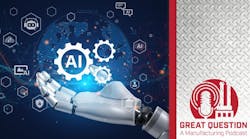Dale Tutt is the vice president of industry strategy at Siemens Digital Industry Software. He spent more than 30 years in the aerospace and defense industry designing and building new aircraft and new spaceships before joining Siemens. Aaron Merkin is chief technology officer (CTO) of Fluke Reliability Solutions. In his current position, Aaron is responsible for developing and executing IIoT strategy and leading the technology team in the continued creation of innovative solutions for customers. Dale and Aaron recently spoke with Smart Industry managing editor Scott Achelpohl about artificial intelligence’s impact on the manufacturing industry.
Below is an excerpt from the podcast:
IW: Aaron and Dale, I want to ask you about generative AI, specifically the large language models like open AI. How might they be deployed for many manufacturing operations directly on the plant floor, for example?
AM: So, we're a reliability-focused organization. If you think about the plant floor, you've got your maintenance technicians and you have your operators and the equipment. And what we see with our focus on reliability is the use of generative AI to address the skills shortages, to some extent labor shortages, but more importantly, the eroding of domain expertise and skills in industrial facilities. And as Dale alluded to, creating copilot-like capabilities where you're able to take a relatively junior engineer or technician and through the kind of adaptive coaching and directions to them, have them perform much more of the complex maintenance tasks than perhaps they would be able to with just their limited amount of experience. So, there's a bit of taking the graying workforce, somebody who's been working with machines for 20 or 30 years, and trying to codify that knowledge, either through looking backwards at the history of work orders performed on assets, or through more direct captive technologies and how they perform their work, create a baseline definition of how the guided work instructions should be provided to reliability engineers, but then make those instructions themselves.
